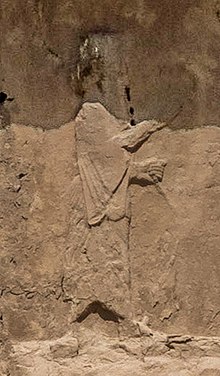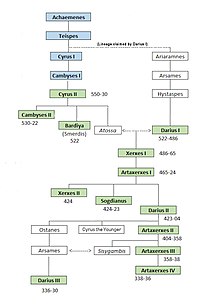| Darius II 𐎭𐎠𐎼𐎹𐎺𐎢𐏁 | |
|---|---|
 Darius II as depicted on his tomb in Naqsh-e Rostam | |
| King of Kings of the Achaemenid Empire | |
| Reign | 423–404 BC |
| Predecessor | Sogdianus |
| Successor | Artaxerxes II |
| Pharaoh of Egypt | |
| Reign | 423–404 BC |
| Predecessor | Sogdianus |
| Successor | Amyrtaeus |
| Died | 404 BC |
| Spouse | Parysatis |
| Issue | |
| Dynasty | Achaemenid |
| Father | Artaxerxes I |
| Mother | Cosmartidene of Babylon |
| Religion | Zoroastrianism |
Darius II (Old Persian: 𐎭𐎠𐎼𐎹𐎺𐎢𐏁 Dārayavaʰuš; ‹See Tfd›Greek: Δαρεῖος Dareios), also known by his given name Ochus (Greek: Ὦχος Ochos), was King of Kings of the Achaemenid Empire from 423 BC to 405[1] or 404 BC.[2]
Artaxerxes I, who died in 424 BC, was followed by his son Xerxes II. After a month and half Xerxes II was murdered by his brother Sogdianus. His illegitimate brother, Ochus, satrap of Hyrcania, rebelled against Sogdianus, and after a short fight killed him, and suppressed by treachery the attempt of his own brother Arsites to imitate his example.[citation needed] Ochus adopted the name Darius (Greek sources often call him Darius Nothos, "Bastard"). Neither the names Xerxes II nor Sogdianus occur in the dates of the numerous Babylonian tablets from Nippur; here effectively the reign of Darius II follows immediately after that of Artaxerxes I.[2]



Historians know little about Darius II's reign. A rebellion by the Medes in 409 BC is mentioned by Xenophon. It does seem that Darius II was quite dependent on his wife Parysatis. In excerpts from Ctesias some harem intrigues are recorded, in which he played a disreputable part.[2] The Elephantine papyri mention Darius II as a contemporary of the high priest Johanan of Ezra 6:10.[3][4] Darius II is mentioned in the books of Haggai, Zechariah, and Ezra–Nehemiah of the Hebrew Bible (the Christian Old Testament). There is some debate on whether these books refer to Darius the Great though.
- ^ Brill's New Pauly, "Darius".
- ^ a b c One or more of the preceding sentences incorporates text from a publication now in the public domain: Meyer, Eduard (1911). "Darius". In Chisholm, Hugh (ed.). Encyclopædia Britannica. Vol. 7 (11th ed.). Cambridge University Press. p. 833.
- ^ Pritchard, James B. ed., Ancient Near Eastern Texts Relating to the Old Testament, Princeton University Press, third edition with supplement 1969, p. 492
- ^ Bezalel Porten (Author), J. J. Farber (Author), C. J. F. Martin (Author), G. Vittmann (Author), The Elephantine Papyri in English (Documenta Et Monumenta Orientis Antiqui, book 22), Koninklijke Brill NV, The Netherlands, 1996, p 125-153.